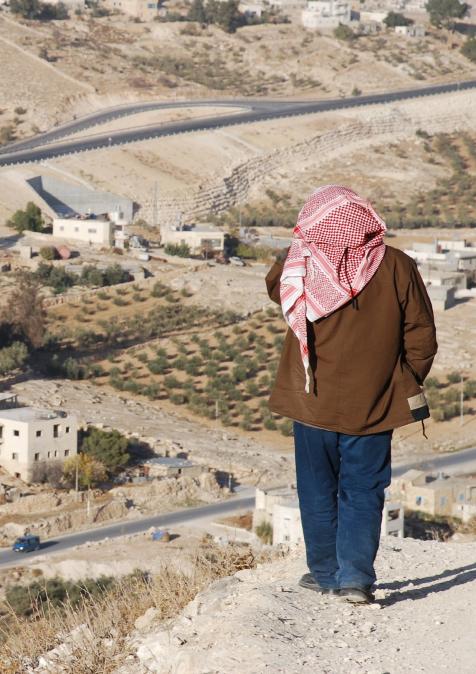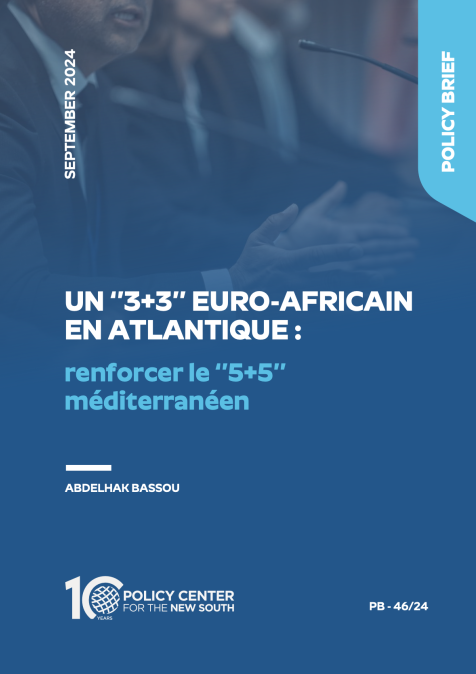Publications /
Opinion
The title of the Policy Brief seems alarming. ‘Israel-Palestine The Last Chance for a Just Solution’, an assessment by Abdelhak Bassou, Senior Fellow of the Policy Center for the New South, affiliated professor at Mohammed VI University in Rabat, and one of the leading security experts of Morocco. His paper, published in November 2023, could not have more timely, dramatic, urgent, and constructive. Scenes of the apocalypse for an estimated twelve million people in a region, considered by its habitants blessed by religion and history, reaching back thousands of years into biblical time, and forever there is war, death, starvation, torture, prison. The future?
Zionists like Ben Gurion, Israel’s first prime minister, arrived in the region around 1906. The land was controlled by the Ottoman Turks, then the British, but the religious migrants were convinced that they had to recreate Eretz Israel, their holy land, ready to expel the Palestinian shepherds, farmers, and educated Palestinians, who had been cultivating their land since time immemorial. Is it conceivable, under international law, to reclaim property owned since 1200 BC or on the basis of the discovery of some polished rock in the desert, allegedly part of a synagogue’s ruin?
The settlers, driven into the desert and bare land by antisemitism at home, later escaping the horror of the holocaust, were determined to recreate their imagined kingdom, ready to use violence, as they proved by bombing the British administrators of ‘Mandatory Palestine’, some based in Jerusalem’s King David hotel, killing 92 people in July 1946. The killing never ended, wars became part of daily survival, beginning with the foundation of Israel in 1948, blessed by the United Nations, which suggested two entities in the region, the Muslim Arabs, the Israeli Jews. How many wars have shattered normality in the region? 1948, 1956, 1967, 1973, 1982, and now 2023, massacres of Israeli athletes by Palestinian terrorists in Munich, hijacking of planes, bombing attacks—75 years of violence, a cycle of desperation, a lifetime surviving as refugees, a diaspora of an estimated seven million, their return home rejected by Israel, which has replaced the Palestinians with Russian Jews, Ethiopian Jews, American Jews, 700,000 in number, possibly almost a million, settling in the occupied West Bank annexing more land, expelling Palestinians from their ancestral land so the ultra-orthodox settlers can live their biblical dream created in Brooklyn, New York, Los Angeles, Budapest, or Paris, suffocating Palestinian aspirations to exist in freedom and dignity, not as beggars for water and electricity, controlled by Israel, or school meals handed out by United Nations organisations—150,000 daily.
While manmade satellites travel 18 million miles and some light years plus into space, to trace the origins of mankind, wars consume lives and energy on earth—Syria, Afghanistan, Libya, Yemen, Ethiopia, Ukraine, Palestine’s Gaza , surviving in an open-air prison, forgotten, until early October of this year, when the oppressed turned frustration, hate, once more, into violence, uncontrolled brutality, kidnappings of children and women, the enemy replying with familiar methods, destroying hospitals, killing even newborns, who did not have a chance to open their eyes—the divine spirit of mankind crushed by army boots. Again, shock, protests around the world, even students of elite universities, such as Harvard, supported the Palestinian cry for freedom, the right to dream, the permission to embrace human dignity.
An estimated 1.5 million Palestinians still exist in 58 recognized United Nations Relief and Works Agency (UNRWA) refugee camps in Jordan, Syria, Lebanon, Gaza, and the West Bank. No date for a permanent ceasefire is predictable; only the exchange of civilian hostages and Palestinian prisoners is capturing attention and pity. The military showdown will continue, turning miserable Gaza into a land of ruins, the human spirit reduced to a giant pyre.
Yet, despite the horror, Abdelhak Bassou insists in his Policy Brief that the international community seems more convinced than ever that permanent peace between Israel and Palestine can only be achieved by a ‘Two-State Solution’, with the enemies existing side by side as neighbors: “The movement in favor of such a solution is so strong that its implementation might find the right movement as soon as the current war is over,” he wrote. “It is at the end of the current war that international pressure must be stepped up on Israel to move directly and seamlessly into the process of establishing a Palestinian state.”
Is It Still Possible?
Even U.S. President Joe Biden, who recently visited Israel at war in person, “wants a two state solution for Israel-Palestine peace”, reported NPR (October 27, 2023). Is it still possible? When I interviewed Yassir Arafat in 1968 in a Fatah training camp in the occupied Jordan Valley, the Palestinian leader said his movement was “living in the throes of victory”. Palestine, the dream, would soon be reality (Policy Center for the New South Blog, May 31, 2018). Two years later we met again, this time in Damascus, Syria, and Arafat was convinced the creation of Palestine would “just be a question of time. Soon I assure you, soon, we will be celebrating” (Der Spiegel, February 15, 1970).
“I killed myself to give the Palestinians a state,” remembered U.S. President Bill Clinton (Politico, May 13, 2016). “I had a deal they turned down that would have given them all of Gaza.” But Hilary Clinton, Bill’s wife and former secretary of state, who arranged the meeting between Israeli prime minister Benjamin Netanyahu and the Palestinian president Mahmoud Abbas in 2010, said “Arafat just walked away”. The Palestinian Liberation Organization leader never explained to his contacts in Washington why he turned the historic deal down, and apparently the Palestinians never made a counteroffer to the Clinton proposal, which was agreed to by the Israelis.
In some other major conferences, more than a dozen over the last decades, the enemies were close to deals, but it was the ‘right to return’ of Palestinian refugees that was in the way, then the insistence by Israel that major Jewish settlements should be kept in the new State of Palestine, or the demand by Palestinian negotiators that Jerusalem should also be the capital of Palestine. As well as the two-state solution, other proposals were discussed: the one-state idea, Palestinians and Israelis united in a state, reaching from the Jordan River to the Mediterranean Sea. A three-state solution was considered: Jordan managing the West Bank, Egypt managing Gaza and Israel taking care of Israel, in a kind of confederation, open borders as in the EU. “Some leftists and Palestinians support the creation of a democratic, secular country”, reported National Public Radio (NPR), “in which Arab Muslims would outnumber Jews. Some rightists and Israelis would prefer to see Israel annex the West Bank, either forcing out Palestinians or denying them the right to vote, which is illegal under international law. Other Israelis would rather focus on a Jewish than a democratic Israel.”
The PLO declared and accepted in 1988 Israel’s right to exist, but Hamas has never changed the paragraphs in its founding charter calling for the obliteration of Israel. Failed peace talks, recurring clashes and missile attacks from Gaza, expanded Israeli settlements, annexation of land, again and again have led to anger and mistrust, street battles, and political depression, the path to peace seeming forever clogged, a modus vivendi in the shadow of never-ending violence and repression, death replacing diplomacy. Thus, the two-state solution, as reported by NPR, “has seen dwindling support from both, Palestinian and Israelis over the years” (October 27, 2023). A Gallup poll released mid-October (conducted before Hamas’s attack on Israel) found that just 24% of Palestinians living in the West Bank, Gaza, and East Jerusalem support a two-State solution. That figure, noted NPR, is down from 59% in 2012. A Pew Research Center poll released in September found that only 35% of Israelis think a way can be found for an independent Palestine State to exist peacefully, a decline of 15 percentage points since 2013.
Dennis Ross, chief negotiator at the 2000 Camp David summit between Israel and Palestinian leaders told NPR that “as heartbreaking as the situation is … eventually there needs to be a day after. We have to understand Israelis aren’t going anyplace, and Palestinians aren’t going anyplace”. Given that, Ross argued, “we have to find a way towards coexistence, and obviously we are not there now”. Faced with unexpected drama, which overshadows the Ukraine war, the Yemen catastrophe, and the destruction in Syria, global powers are scrambling for solutions, untried formulas for peace, attempting to halt the spiral of escalation. But in 75 years, no lasting reduction of violence has been achieved; no secret recipe has been discovered at the UN, by NATO, the African Union, the Arab League. Josep Borrell, in charge of foreign policy at the European Union confirmed that “peace will not come by itself; it has to be built”. But billions of dollars have been invested, thousands and thousands killed or maimed, and still the only answer seems to be what the study for the Policy Center for the New South, written by Abdelhak Bassou, focused on: the two-state solution.
A Cauldron of Death
Like Bassou, Borrell insists that the two-state solution is “the only viable one we know, and we have only one solution, we must put all our energy into achieving it.” The question posed by the British Guardian (November 4, 2023) is vital, but will, for the time being, be without a conclusive answer: “Israel-Palestine: the two-state solution the answer to the crisis?” The bloodiest fighting for decades “has revived an option once thought dead as the last hope for peace. But how it would look and whether the will to achieve it, exists, remain unclear”. Unending questions must be asked and answers found. Some of them concern the role that China could play in the future of the ‘peace process’ in the Middle East: could its mediation be welcomed, or successful? Could it opt to invest in the rebuilding and modernization of Palestine, supported, who knows, by Russia or even North Korea, which has invited Palestinian leaders like the Marxist George Habash into their isolated world, introducing Palestinians to North Korea’s revolutionary glory (CIA document August 11, 1999).
Would Palestine be allowed to arm its own military, air force included, or to have Saudi Arabia construct a nuclear power station in Palestine, a welcome gift for the newest active member of the United Nations? No question, statehood for Palestine would give Israel a heavy dose of paranoia. A nominally independent Palestine, wrote Nancy Gallagher in her study ‘Learning lessons from the Algerian war of independence’ (Middle East Research and Information Project, winter 2002), “may well mean authoritarian rule, corruption, lack of tolerance for dissent and Islamic extremism”. Ms Gallagher quoted an essay by Tony Judt, professor of history at new York University (The Road to Nowhere, New York Review of Books, May 9, 2002) arguing that “Palestinians would prefer living in an independent state to living in prosperity under Israel hegemony. While it may be true that prosperity under Israel is unsatisfactory, there is little likelihood that a repressive, non-contiguous Palestine mini state dependent on, and with borders controlled by, Israel would give Palestinians much sense of freedom and independence”. Nancy Gallagher believed there is “much merit in the suggestion that Israelis and Palestinians learn to live together with full citizenship rights, and not under Israeli hegemony, but in a pluralistic political system”. Dominique de Villepin, former French foreign minister and prime minister, one of the few global politicians who stood up at the United Nations and warned allies including the United Kingdom and U.S. about an invasion of Iraq, declared (France-Info, October 12, 2023) that the two-state solution is the best security guarantee Israel could dream of: “the establishment of a state right next to you is preferable to facing a profileration of terrorist organizations, a cauldron of death, which will threaten you any moment.”









